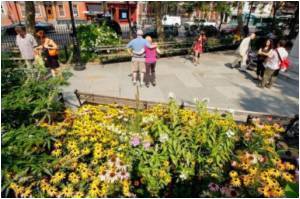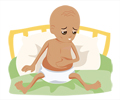Japan has millions of poor people desperately struggling to make ends meet despite the fact that consumer gluttony and jobs for life were once normal in the country.

Nearly one in six Japanese lives below the poverty line -- meaning they earn less than half the median household income, or less than 1,830 dollars for a four-person family -- in a country that prides itself on its egalitarianism.
Many of the worst-off are single mothers, the elderly, and people who lost their jobs in the latest recession, the worst since World War II.
Swelling their ranks has been a new generation of workers who lack the job security their parents enjoyed during Japan's "miracle" growth years from the 1960s onward and through the go-go wealth era of the 1980s and early 90s.
Temporary and part-time jobs and short-term contracts have become the norm for half of all employees under 39 years of age, a group dubbed "Freeters" -- made up of the words "freelancer" and "Arbeiter", German for worker.
"There is a generation gap between those who were hired up until the 90s on permanent contracts and those who entered the job market later," said David-Antoine Malinas, a social scientist at the Maison Franco-Japonaise Tokyo.
Advertisement
"I worked for 20 years as a temporary employee at a branch office of a large company before losing my job in March 2009," said one middle-aged man, a member of the new poor at an anti-poverty meeting organised in Tokyo.
Advertisement
Many on the brink of poverty fall over the edge because of the demise of family structures that once acted as a safety net, said Aya Abe, a researcher at the National Institute on Population and Social Security.
In the past, three generations often lived under one roof, meaning that up to four people -- the parents and grandparents -- could work and pool their wages, which limited the shock of one person losing their job.
Today "many single mothers juggle two jobs," said Abe. "They work in the daytime, then cook dinner for their children before heading off to their second job. They return home around 3:00 am to sleep before a new day begins."
It is now often the elderly -- whose proportion in society is on the rise in rapidly greying Japan, with its low birthrate and high life expectancy -- who pay the heaviest price as poverty grows in Asia's biggest economy.
The role of the company and the family have diminished in people's lives, but the government has failed to fill the void, say experts.
"For the past 20 years, taxes and social security contributions have risen," to the detriment of the poor who have seen little in return, said Abe.
OECD data shows that the government in Japan actually worsens child poverty because it demands more money from low-income families in taxes than it gives them back in benefits -- a situation unique in the developed world.
Social mores dictate that almost no-one begs in Japan, and crime rates are low, but Abe said there is nonetheless widespread "hidden poverty", where people may, for example, skip a meal just to save money.
"I don't turn on the lights and don't use heat or air conditioning in order to save electricity costs," said one student living on a scholarship in Tokyo, who said he had spent nothing on leisure and bought no clothes for a year.
The Japanese public only became aware of the country's rising poverty in the mid-2000s, a trend many commentators blamed on the neoliberal pro-market reforms under conservative former prime minister Junichiro Koizumi.
"The public became aware after (public broadcaster) NHK first introduced the term 'working poor' in their report, which was followed by the Lehman shock," said Makoto Yuasa, head of the non-profit group Link Association.
Yuasa was the organizer of a tent village of irregular workers who had lost their jobs that arose in the winter of 2008-09 in a park on the edge of Tokyo's government district.
The event stunned many in Japan and helped change official attitudes about the right of everyone -- not just the elderly and disabled, but also young people -- to "seikatsuhogo", or state social benefits.
When the centre-left Democratic Party of Japan took power last year, it recruited Yuasa as an advisor, leading to the establishment of "one stop service" facilities for the unemployed during his six-month stint.
Japan's growing poverty has brought much soul-searching in the media.
"Poverty's dark shadow can be seen in various social problems -- rising cases of suicide, solitary death and child abuse, and languishing birth rates," the Asashi Shimbun daily said in a recent editorial.
"This is a malaise that can threaten the very existence of our country."
New Prime Minister Naoto Kan in his first official speech vowed to do everything possible to "reduce the factors that make people unhappy".
"The feeling of suffocation has increased" since the early 90s, he said, highlighting the suicide rate of more than 25 per 100,000 people, above the global average of 16 per 100,000, according to the World Health Organisation.
The government has introduced bills to establish a minimum pension of 70,000 yen (635 euros) per month for elderly people without financial resources, and to strengthen safeguards for temporary workers.
However, since his party took heavy losses in July 11 upper house elections, these bills are on hold and may never become law.
Source-AFP










